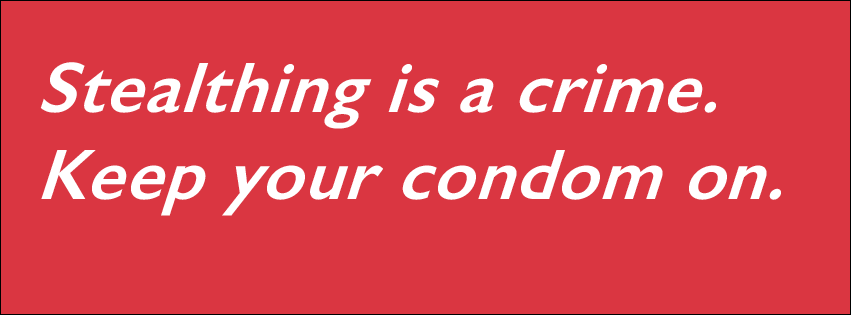The UN’s factsheet on gender based violence makes for grim reading. One in three women have been subject to physical or sexual violence by an intimate partner.
In 37 countries, rape perpetrators are not prosecuted as a matter of government policy when they are married to or subsequently marry the victim. ‘Sexual violence and harassment’ and ‘intimate partner violence’ are each prevalent enough to get their own section, depressingly, and ‘stealthing’ (non-consensual condom removal) has a place for discussion under either.
What is ‘stealthing’?
Removing a condom intentionally during penetrative intercourse without the consent of a partner – in the UK, this is sexual assault. The term ‘stealthing’ has come into popular use recently – as Kate Russell from the charity Rape Crisis has said, “it’s a very acceptable term for something that’s extremely unacceptable and actually an act of sexual violence.”[1]
What is BANG undercover?
We are a campaign group to raise awareness that ‘stealthing’ – removing a condom intentionally during penetrative intercourse without the consent of a partner – is a crime. We want to educate people that it’s a sexual offence, that it is prevalent and has a real impact on people. We want widespread recognition that it’s a crime to influence people to change their behaviour.
Why does non-consensual condom removal breach consent?
When you consent to having sex with a condom, you’re agreeing to having sex with a condom on. Under UK law, consent is required for each sexual act, and is specific to the agreed-upon act. Sandra Paul, a solicitor specialising in sexual offences, says: “If I say I’m going to have sex with you in a certain way, if you do it different, you don’t have consent for the other act. This would be considered rape.”[2]
Some other reasons to discourage ‘stealthing’…
Sex without a condom involves a much greater degree of risk than without, both of pregnancy and of STIs. When you consent to having sex with a condom, you’re consenting to that level of risk. The level of risk is so much greater without a condom that it requires an acknowledgement and acceptance of that risk. It’s unfair for people who have taken all reasonable steps to protect themselves to be put at a risk of harm against their consent.
How can you help?
- Pledge your support: bangundercover.club/
- Like (FB) – facebook.com/bangundercover/
- Follow (IG) – instagram.com/bang_undercover
- Follow again (Twitter) – twitter.com/bang_undercover
- Share!
[1] http://www.bbc.co.uk/newsbeat/article/39705734/stealthing—what-you-need-to-know
[2] http://www.bbc.co.uk/newsbeat/article/39705734/stealthing—what-you-need-to-know
About the Author: Ari Potter is a Bengali-British writer and campaigner who’s particularly interested in gender equality, mental health and cultural identity. She and a group of like minded volunteers launched the campaign in their spare time because they wish sex education in the UK was as candid and fun as sex can be.




